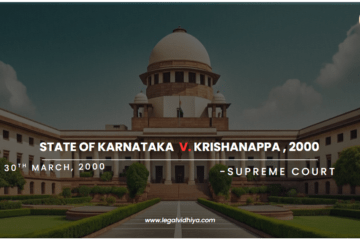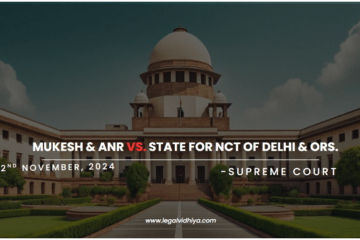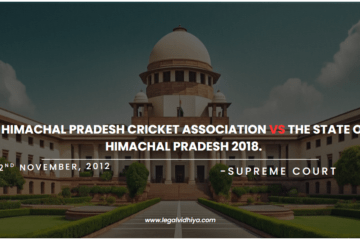| Citation | 2022 AIR 768 2022 (3 ) SCC 649 2022(2 ) SCALE 422 |
| Date of Judgement | 28.01.2022 |
| Court | Supreme Court of India |
| Case Type | Civil Appeal |
| Petitioner | THE DIRECTOR DIRECTORATE OF ENFORCEMENT |
| Respondent | K. SUDHEESH KUMAR |
| Bench | HON’BLE MR. JUSTICE M.R. SHAH, HON’BLE MRS. JUSTICE B.V. NAGARATHNA |
| Referred | MACP Scheme for the Central Government Civilian EmployeesThe Union of India vs M.V. Mohanan Nair |
Facts of the Case
The Directorate of Enforcement has filed an appeal against a judgment and order passed by the High Court of Kerala at Ernakulam regarding the Modified Assured Career Progression (MACP) Scheme for Central Government Civilian Employees. The case involves respondent Nos. 1 & 2, who were appointed as Assistant Enforcement Officers in 1976 and 1977, respectively. In 2009, the Government of India notified the MACP Scheme, which provided for a grade pay of Rs.5400 in PB-2 and PB-3. However, respondent Nos. 1 & 2 were initially granted a grade pay of Rs.6600 for PB-3 under the MACP Scheme, which was later corrected to Rs.5400 by the audit department. The High Court allowed the grade pay of Rs.6600 to respondent Nos. 1 & 2, contrary to the MACP Scheme, leading to the present appeal by the appellant (Director, Directorate of Enforcement) demanding that the order be reversed.
Issues involved in the case
The interpretation and application of the MACP Scheme regarding the grade pay entitlement and the subsequent legal proceedings related to the granting of the grade pay of Rs.6600 in PB-3 under the MACP Scheme.
Contention of the Parties
Petitioner
The directorate of enforcement, acting as the petitioner, based its arguments on the interpretation and application of the modified MACP Scheme. The petitioner claimed that according to the MACP Scheme, employees are entitled to the immediate next higher grade pay as per the revised rules of 2008. It was emphasized that the MACP Scheme is not related to the next promotional post, but rather the employee’s entitlement is determined by the recommended revised pay bands and grade pay. The petitioner argued that the modified scheme specifies that grade pay of Rs 5400 in PB-2 and Rs 5400 in PB-3 should be considered as separate grade pays for the purpose of granting upgradations under the MACP Scheme. Therefore, the petitioner asserted that the respondents, who are PB-2 employees, should be entitled to the next grade pay of Rs 5400. In summary, the petitioner’s position was that the High Court had mistakenly granted the respondents a grade pays of Rs 6600, which goes against the provisions of the MACP Scheme and the recommendations of the expert body.
Respondent
The private respondents argued that they were entitled to a higher pay grade and stressed that the purpose of higher-grade pay would be defeated if both PB-2 and PB-3 had the same grade pay of Rs.5400. They claimed that since the next higher-grade pay was Rs.6600, the High Court correctly ordered a grade pay of Rs.6600. They emphasized that the issue was not about the next promotion, but rather about the next higher grade pay. Furthermore, they referred to the court’s decision in the case of State of Rajasthan Vs. Mahesh Kumar Sharma (2011) 4 SCC 257 and requested that if the Court decided to overturn the High Court’s judgment and order, no recovery should be made as they had already retired and the difference in pension would be of Rs.1200 approximately per month so far which is difficult for them to refund.
Judgement
The judgement of the court ruled in favour of the appellant, setting aside the impugned judgment and order passed by the High Court. The Supreme Court clarified that the MACP Scheme grants employees the right to receive the immediate next higher grade pay based on the recommendations of the pay commission and the CCS (Revised Pay) Rules, 2008. It emphasized that this scheme is unrelated to the next promotional post. As a result, respondent Nos.1 & 2 were deemed entitled to a grade pay of Rs.5400 instead of the claimed Rs.6600. The court directed that the pensions of respondent Nos.1 & 2 be adjusted accordingly, without any recovery of the difference in pension between the grade pay of Rs.5400 and Rs.6600 for the period prior to December, 2021. This decision was made considering that respondent Nos.1 & 2 were retired employees and it would be challenging for them to repay the amount. However, starting from January, 2022, their pension will be recalculated based on the judgment and order, taking into account their grade pay of Rs.5400. The appeal was allowed, along with the aforementioned observations and directions, and no costs were imposed.
Conclusion
The court , in this case, established that the modification of the MACP Scheme by the Government, based on the recommendations of expert bodies like the pay commission, falls under government policy. The court in the case of M.V. Mohanan Nair (supra) held that interfering with these recommendations would have a significant impact on the exchequer. Therefore, the high court does not have the jurisdiction to interfere with the Government’s policies regarding the MACP Scheme, which was implemented after accepting the Sixth Central Pay Commission.
Hence the judgement and order passed by the high court was quashed and set aside and the judgement and order of the central administrative tribunal was reinstated.
References
https://www.registry.sci.gov.in/library-portal/suplis/famous2.asp?case1=78186
https://main.sci.gov.in/supremecourt/2020/23494/23494_2020_42_1501_32957_Judgement_28-Jan-2022.pdf
The case analysis is written by Harsha Shekhawat, a student of Lloyd Law College, Greater Noida, 1st semester, an intern under Legal Vidhya.
Disclaimer: The materials provided herein are intended solely for informational purposes. Accessing or using the site or the materials does not establish an attorney-client relationship. The information presented on this site is not to be construed as legal or professional advice, and it should not be relied upon for such purposes or used as a substitute for advice from a licensed attorney in your state. Additionally, the viewpoint presented by the author is of a personal nature.




0 Comments